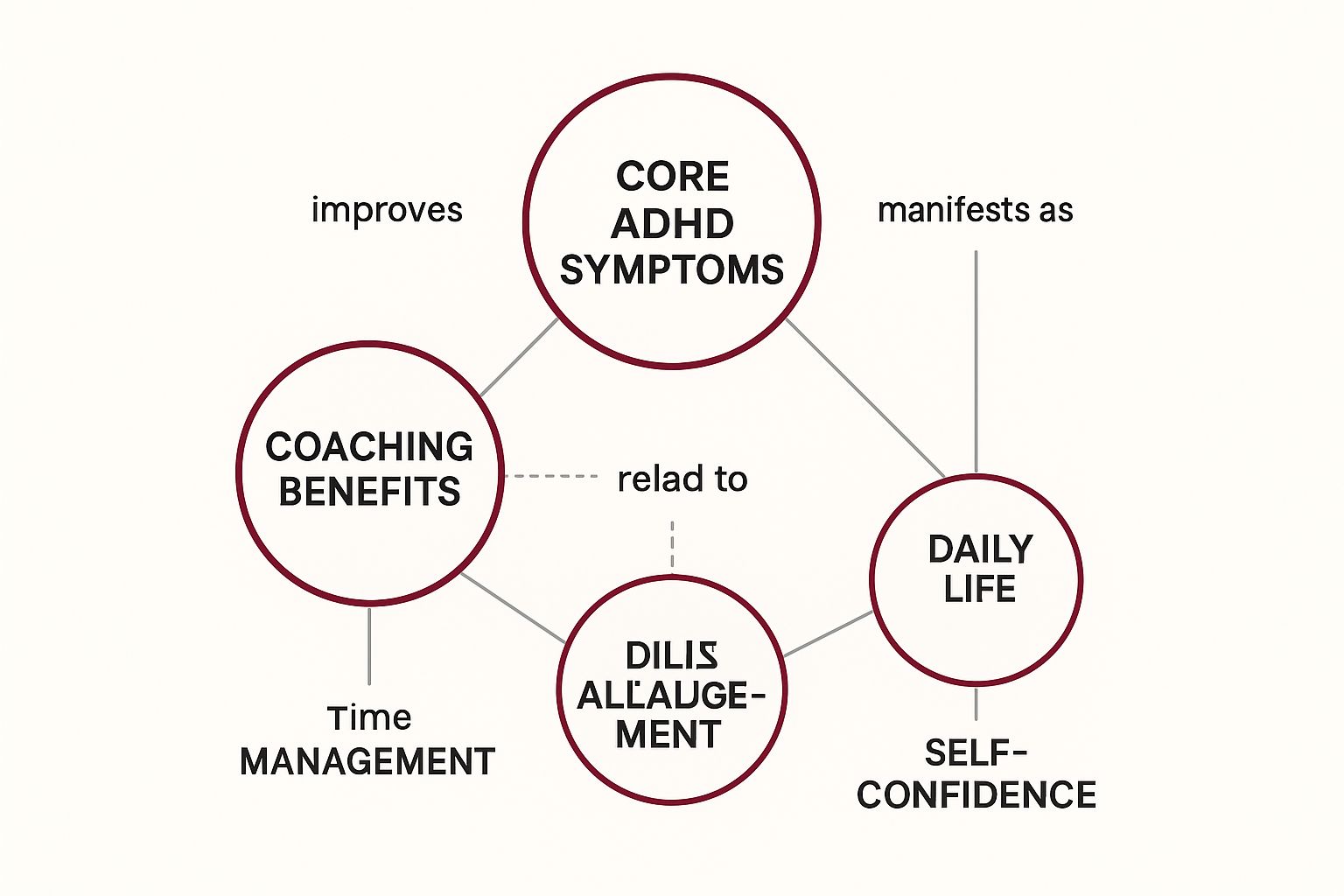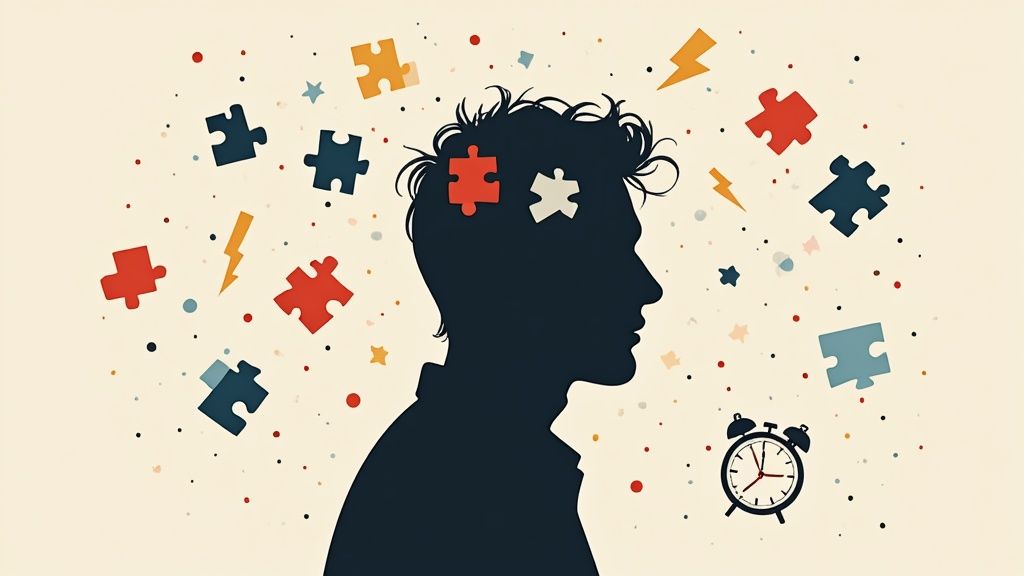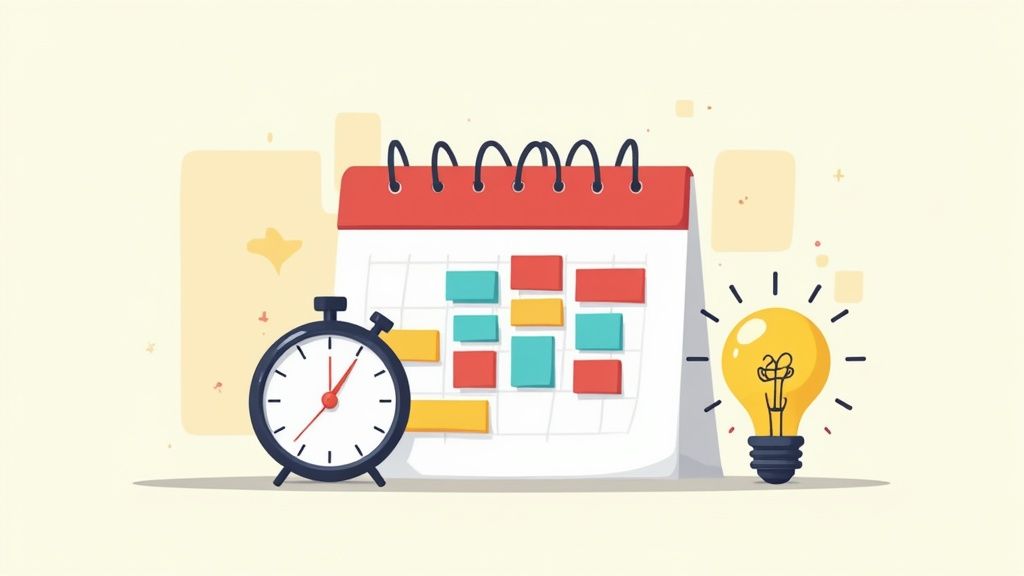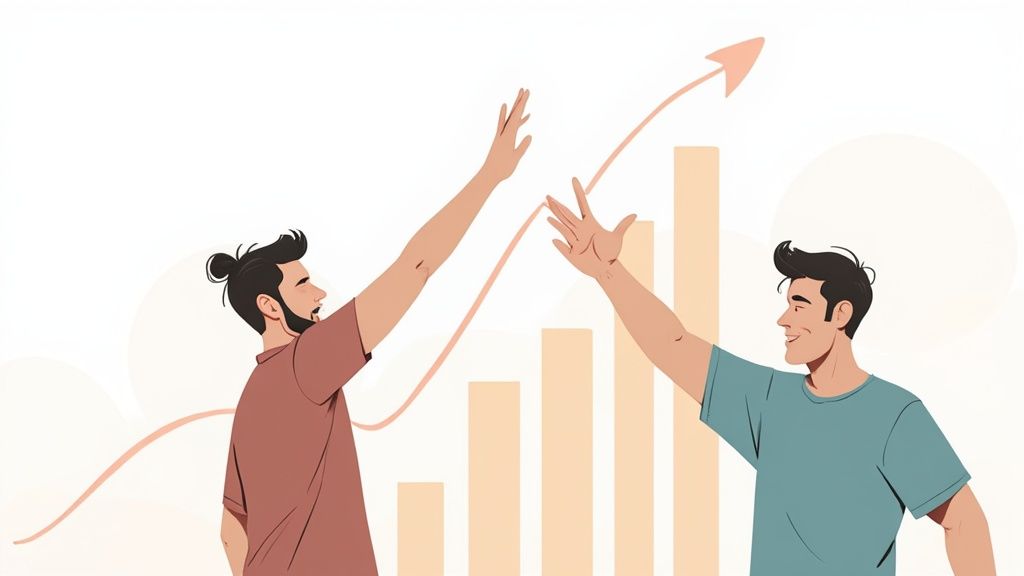ADHD coaching for adults is a collaborative partnership designed to help you navigate the unique challenges of the ADHD brain. Think of it less like therapy and more like having a personal trainer for your executive functions—those crucial mental skills that manage planning, focus, memory, and organization.
What Is ADHD Coaching and How Can It Help You?
Living with adult ADHD can feel like you've been given all the pieces to build something amazing—creativity, energy, intelligence—but the instruction manual is written in a language you can't quite decipher. It's frustrating. ADHD coaching acts as your guide, helping you understand your specific brain wiring and build systems that work with it, not against it.
A key difference from therapy is that coaching is action-oriented and forward-looking, rather than focusing on healing past emotional wounds. An ADHD coach helps you pinpoint specific, present-day challenges, like chronic procrastination or an overflowing inbox, and works with you to create practical, real-world strategies to overcome them. It’s a partnership built on accountability, structure, and empowerment.
The Goal Beyond Organization
While getting organized is often a welcome side effect, the real purpose of ADHD coaching for adults is to build profound self-awareness and self-trust. It's about learning to recognize what drains your energy versus what ignites your hyperfocus, and then redesigning your life around those powerful insights. The process helps you shift your mindset from seeing ADHD as just a list of deficits to understanding its inherent strengths.
For example, a coach might help you:
- Create visual systems and reminders that bypass a taxed working memory.
- Break down overwhelming projects into small, manageable steps to conquer executive dysfunction.
- Develop routines that conserve your mental energy for the tasks that matter most.
The infographic below shows how coaching connects common ADHD symptoms to daily struggles and provides targeted support to address them.

As you can see, coaching gets to the root of these daily frustrations by building skills that directly improve things like self-confidence and time management.
Understanding the Difference Between Coaching and Therapy
It's common to wonder how coaching differs from therapy. While both are incredibly valuable, they serve different purposes. The table below breaks down the key distinctions to help you decide which type of support is right for you.
| Aspect | ADHD Coaching | Therapy |
|---|---|---|
| Focus | Present & Future | Past & Present |
| Primary Goal | Building skills, strategies, and systems for managing ADHD symptoms. | Healing emotional wounds, processing trauma, and treating mental health conditions. |
| Approach | Action-oriented, practical, and solution-focused. | Introspective, insight-oriented, and focused on emotional and psychological healing. |
| Relationship | Collaborative partnership, like a personal trainer or strategist. | Clinical relationship between a licensed healthcare provider and a patient. |
Both coaching and therapy can be part of a comprehensive support plan for an adult with ADHD. One is not better than the other; they simply address different needs.
A Growing Need for Specialized Support
With awareness of adult ADHD on the rise, the demand for this kind of tailored support has exploded. As of 2025, an estimated 404 million adults worldwide have ADHD, and more than half of them receive their diagnosis in adulthood. This trend underscores a massive need for strategies designed for adult life and its many responsibilities.
ADHD coaching is not about "fixing" you. It’s about giving you the tools, structure, and support to manage your own brain more effectively. It’s a journey toward harnessing your potential, not changing who you are.
Ultimately, coaching is an investment in building a more intentional and less stressful life. By zeroing in on practical skills, this process empowers you to take control. For a deeper dive into how this all works, take a look at our guide on executive function coaching for adults.
The Core Principles of Effective ADHD Coaching
When we talk about effective ADHD coaching for adults, we're not just recycling generic productivity hacks you could find anywhere online. This is a highly specialized approach, built on a deep understanding of the unique wiring of the ADHD brain. These principles aren't just theory; they're designed for practical, day-to-day life to create change that actually sticks.
At its core, coaching is about helping you figure out what you really want. We work to define goals that aren't just achievable but are also deeply connected to your personal values. This is key to avoiding the classic ADHD trap of chasing shiny new interests or getting buried under a to-do list that feels completely meaningless. Your coach is your partner in this, making sure your energy is pointed toward what truly matters to you.
Building Skills Through Co-Creation
A foundational principle here is co-creation. Think of it as a partnership. You and your coach work together to build strategies that fit your life. This isn't a top-down model where I just hand you a set of instructions. It’s more like a lab where we experiment with different tools and systems until we find what genuinely works for you.
This collaborative process is all about building up those crucial executive function skills. So instead of just saying, "you need to be more organized," we get practical. We might try out specific techniques tailored to how your brain operates.
- Task Initiation: Ever heard of a "body double"? It's a game-changer. Just having someone present (even virtually on a video call) can provide that little nudge of accountability you need to finally start that task you've been dreading.
- Time Management: Time can feel like a slippery, abstract concept. We can make it more concrete and manageable with things like visual timers or color-coded calendars that your brain can actually process.
- Organization: We can design simple systems that cut down on visual clutter and make decisions easier. A great example is creating a designated "landing strip" by your front door for keys, mail, and your wallet so you're not scrambling every time you leave the house.
These aren't just random tips. They're targeted ways to support weaker executive functions, helping daily life feel less chaotic and a lot more intentional.
The Power of Accountability and Mindset
Another huge piece of the puzzle is non-judgmental accountability. For so many adults with ADHD, a lifetime of missed deadlines and forgotten promises has created a heavy burden of shame. A coach provides that external check-in point without all the emotional baggage.
This consistent, supportive presence helps break the brutal cycle of procrastination and avoidance. Just knowing you have someone in your corner can be the motivation you need to follow through, turning your intentions into actual accomplishments.
A key shift in ADHD coaching involves reframing your relationship with your own brain. It’s about moving from a narrative of deficits to one of strengths, learning to work with your unique cognitive style instead of constantly fighting against it.
This mindset work is absolutely crucial. A good coach helps you spot and lean into your ADHD-associated strengths—like your incredible creativity, out-of-the-box thinking, and the ability to hyperfocus on things that truly capture your interest.
For instance, we might figure out how to structure your work to take advantage of those powerful bursts of intense focus, rather than trying to force yourself into a rigid 9-to-5 schedule that just leaves you drained. When you start to shift your perspective, you begin to see your ADHD not as a liability you have to manage, but as an integral part of who you are, complete with its own unique advantages.
Real-World Benefits of ADHD Coaching
It's one thing to talk about the principles of ADHD coaching, but what does it actually look like day-to-day? The benefits go way beyond just having a cleaner desk or a less chaotic calendar. We're talking about real, tangible improvements that smooth out the friction of daily life and help you build a genuine sense of trust in yourself.
Think about what it would feel like to manage a big, hairy project at work without that all-too-familiar wave of last-minute panic. Or to finally—finally—create a system for handling mail that doesn't end with a pile of unopened envelopes staring you down. That's the practical magic of ADHD coaching for adults. It’s about building systems designed for your brain, which is why they actually stick.
This isn’t just a niche need, either. The world is waking up to ADHD. Online searches for "ADHD" shot up by an average of 270.5% across 19 countries between 2019 and 2023. This explosion in awareness shows just how many people are looking for support that delivers real results. You can dive deeper into these ADHD statistics and see why personalized support has never been more vital.
From Chaos to Calm Confidence
Let me tell you about a client—we’ll call her Maya. Before coaching, her home was a constant source of stress. Unfinished projects were everywhere, important deadlines got missed, and it was causing real friction with her family. More than that, it was chipping away at her self-esteem. She felt like she was always behind, just stuck in a loop of overwhelm and avoidance.
We started small. Her first goal was just to clear the dining room table every night before bed. That one small win created a little spark of momentum. From there, she worked with her coach to set up visual systems for household chores and used accountability check-ins to finally tackle the financial paperwork she’d been dreading for months.
The real win in coaching isn't just the organized home or the managed schedule. It's the internal shift—from feeling chronically overwhelmed and incapable to feeling competent, confident, and finally in the driver's seat of your own life.
The Ripple Effect of Small Wins
Those small, consistent successes started to ripple out, touching every part of her life.
- Stronger Relationships: By learning emotional regulation skills, her conversations with her partner became less reactive and more about teamwork.
- Enhanced Productivity: At work, she learned how to break down huge projects, delegate without guilt, and ask for the accommodations she needed. She even got a promotion.
- Increased Self-Esteem: This was the big one. Maya started to trust herself again. That constant, nagging inner critic got a lot quieter, replaced by a voice of self-compassion and a real belief in what she could do.
This is what effective ADHD coaching is all about. It’s not a magic wand, but it is a structured, supportive process that empowers you to build a life that feels less like a constant battle and more like you.
How to Find the Right ADHD Coach for You
Finding the right coach is probably the single most important step in making ADHD coaching for adults work for you. This isn’t about tracking down the person with the fanciest credentials or the highest price tag; it's about finding the human whose expertise, style, and personality actually click with your own. Think of it like building a personal board of directors—you need a strategist who gets your mission.
A great place to start is by looking for some key credentials. While the coaching world is largely unregulated, certifications from respected organizations like the International Coaching Federation (ICF) or the ADHD Coaches Organization (ACO) are a good sign. They show a real commitment to professional standards and ethics.
Even more crucial, though, is finding coaches with specific, advanced training in adult ADHD. These are the people who truly understand the nuances of things like executive function challenges, emotional dysregulation, and Rejection Sensitive Dysphoria (RSD). This initial check helps you build a solid shortlist of people who have the right foundation to help you.
The All-Important Chemistry Call
Once you have a few names, the next step is to schedule some introductory calls. Most coaches call these "chemistry calls," and they're your chance to interview them and—just as importantly—see if your personalities mesh. A good coaching relationship is built on trust and rapport, so feeling comfortable and understood right from the get-go is non-negotiable.
Before you hop on these calls, take a minute to think about what you really want to achieve. What are your biggest daily frustrations? What long-term goals feel like they're always just out of reach? Having some clarity on your "why" will make it much easier to figure out if a coach's approach is the right fit.
Your goal isn’t to find a coach who has all the answers. It’s to find one who asks the right questions—the kind that spark new insights, challenge your old assumptions, and empower you to discover your own solutions.
During the conversation, pay close attention to how they listen. Do you feel genuinely heard and validated? Or do they seem quick to jump in with generic, one-size-fits-all advice? This first interaction is often a pretty clear preview of what your future sessions will feel like.
Questions to Ask a Potential Coach
To really make the most of your consultation, it helps to show up with a list of questions. This isn't about grilling them; it's about giving yourself a consistent way to compare different coaches so you can make a decision you feel good about.
Here's a table with some key questions to get you started on finding the perfect fit for your ADHD coaching journey.
| Category | Key Question |
|---|---|
| Coaching Process | "Can you walk me through your specific coaching process for adults with ADHD?" |
| Specialization | "What's your experience with clients who share my specific challenges, like procrastination or career changes?" |
| Measuring Progress | "How do you help clients define their goals and then track their progress?" |
| Credentials & Training | "What kind of training or certification do you have that's specifically focused on adult ADHD?" |
| Session Structure | "What does a typical coaching session with you look like?" |
| Client Fit | "How do you determine if we're a good fit to work together?" |
| Logistics & Fees | "What are your package options, session lengths, and fees?" |
Having these questions ready helps you gather the information you need to make a confident choice. You're looking for someone who not only has the right skills but also feels like a true partner in your corner.
The good news is that the rise of virtual coaching has made it easier than ever to connect with top specialists, no matter where you live. Data from 2025 showed that a staggering 97% of ADHD coaching sessions were happening online, a trend that the pandemic really pushed forward. This remote-first approach opens up a world of possibilities.
Ultimately, the best choice is the coach who makes you feel both supported and genuinely inspired to take action. If you're exploring your options, our resources on online coaching for ADHD or ASD can offer more guidance.
A Look Inside Your First ADHD Coaching Sessions
Walking into your first ADHD coaching session can feel a little uncertain, but the whole process is designed to be clear and collaborative right from the start. Think of it less like a stuffy meeting and more like a strategic workshop. You and your coach are a team, and you are always in the driver's seat.
Each session will usually kick off with a check-in. This is your time to share what's been going on since you last connected—celebrating the wins (no matter how small!) and pointing out any roadblocks that popped up. Did that new organizational strategy click, or did procrastination sneak back in? This conversation sets the stage for everything else.
Setting the Agenda Together
After the check-in, you and your coach will decide on the agenda together. This isn't a top-down thing where the coach tells you what to work on. Instead, you’ll be asked a simple but powerful question like, "What would be most helpful for you to focus on today?" This makes sure every minute of the session is relevant to your immediate, real-world challenges.
The topic could be anything. Maybe you need to brainstorm how to tackle a monster project at work, or perhaps you're just trying to figure out a better system for managing household chores. The focus is always on what matters most to you, right now. The entire structure of ADHD coaching for adults is built on this idea of co-creation, making you an active partner in your own progress.
The core of a coaching session is a non-judgmental, forward-looking conversation. It's a dedicated space to untangle the "why" behind your challenges and build practical, actionable plans to move forward, free from shame or blame.
Brainstorming and Building Your Action Plan
Once you've got a focus, the real work begins: brainstorming. Your coach is your strategic partner here, helping you explore different tools and approaches. For instance, if you're struggling with deadlines, you might look at different planning methods. For more ideas, check out our guide on time management for adults with ADHD. The goal is to find what truly clicks with how your brain is wired.
And what if a strategy doesn't work? That's not just okay—it's valuable information. A strategy that fizzles out isn't a failure; it’s just data that helps you and your coach fine-tune the approach. Remember, the goal is progress, not perfection.
By the time the session wraps up, you won’t be leaving with vague ideas. You'll have a clear, concrete action plan with one to three small, manageable steps to take before your next meeting. This breaks overwhelming goals into doable tasks, building momentum and creating a powerful cycle of success.
Common Questions About Adult ADHD Coaching
Deciding to jump into ADHD coaching is a big step, and it's totally normal to have a few questions before you get started. Thinking about the practical stuff—like cost, insurance, and how long it all takes—can give you the confidence to move forward. Let’s clear up some of the most common questions.
Getting these details sorted out gives you the full picture, making it easier to decide if coaching is the right move for you right now.
How Much Does ADHD Coaching Typically Cost?
The price for adult ADHD coaching can really vary. It often depends on a coach’s experience, where they’re located, and if they have a specific specialty. Generally, you can expect individual sessions to run anywhere from $100 to over $300.
A lot of coaches will offer session packages, which can be a better deal and help you stay consistent enough to build real momentum. Group coaching is another great option that’s usually more affordable and adds a nice sense of community. It helps to think of it less as an expense and more as an investment in your own well-being, productivity, and self-trust for the long haul.
Is ADHD Coaching Covered by Insurance?
This is probably the most frequent question we get, and the short answer is: usually, no. Most health insurance plans don’t cover ADHD coaching because it’s not classified as a medical treatment in the same way therapy or medication is.
But don't lose hope just yet. There are a couple of other routes you can check out:
- HSA/FSA Funds: You might be able to use funds from your Health Savings Account (HSA) or Flexible Spending Account (FSA). This is often much smoother if you can get a letter of medical necessity from your doctor.
- Workplace Budgets: Some employers have budgets for professional development or workplace accommodations that could potentially cover coaching costs. It's worth asking.
The best move is always to check directly with your insurance provider and your HR department to see what all your options are before you commit.
How Long Until I See Results?
This is a tricky one because the timeline is so different for everyone. It really depends on what you want to achieve, how much you put into the process, and how complex your challenges are. Think of it as a marathon, not a sprint.
That said, many people feel a sense of relief and notice small, important wins within the first few sessions. It could be something that seems simple, like finally tackling that cluttered desk or successfully mapping out your week without feeling overwhelmed.
Deeper, more lasting changes—like building resilient habits, shifting your core mindset, and mastering executive function skills—typically develop over a period of three to six months of consistent coaching. The aim isn't a quick fix but the creation of sustainable strategies that will support you for years.
Coaching is all about building self-awareness and skills one layer at a time. Every small victory builds on the last one, creating a powerful snowball effect that leads to a huge shift in how you manage your life and see yourself. The focus is on steady progress, not overnight perfection.
Ready to gain clarity and move forward? At the Sachs Center, our expert psychologists provide comprehensive virtual evaluations for ADHD and Autism, offering the diagnostic answers and personalized strategies you need to thrive.


